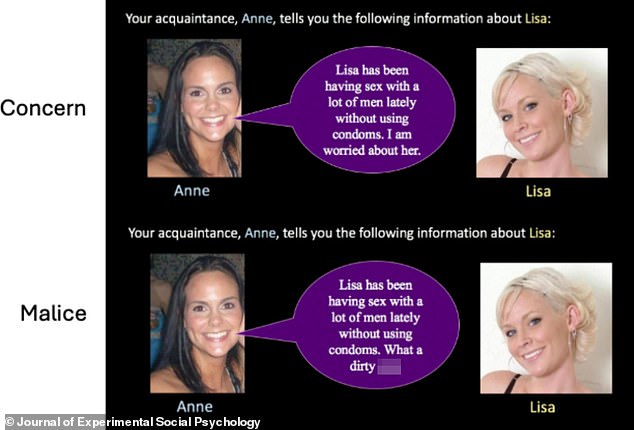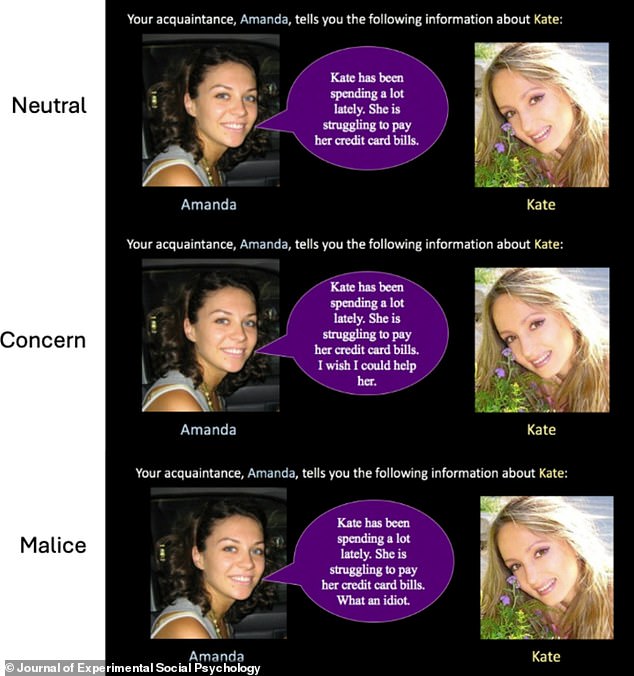Nagging about a colleague? Here’s how to avoid getting a reputation as the mean office gossip, according to scientists
Huddled around the water cooler to share a piece of juicy workplace scandal is becoming a big part of working life.
But it can also be a risky endeavor, as gaining a reputation as an obnoxious office gossip can seriously damage your social standing.
Now scientists in the US have identified a cunning tactic that could help.
Even sprinkling your gossip with a little concern – rather than meanness – makes people like you more, the academics report.
For example, you might say, “Kate got really drunk this weekend; I hope she’s okay,” rather than “she’s such a drunk idiot.”
Huddled around the water cooler to share some workplace gossip is becoming an inevitable part of office life. A study has found that women justify gossiping by expressing concern about their target’s well-being (file photo)
The new study was led by Tania Reynolds, an assistant professor of psychology who studies gossip at the University of New Mexico.
“Women who believe they are genuinely concerned about female gossip targets can effectively pass on reputation-damaging information about same-sex competitors without harming their own social opportunities,” Reynolds and colleagues say.
“Findings suggest that negative gossip delivered with concern effectively damages the reputations of female targets while protecting the reputations of gossipers.”
For the study, approximately 770 participants (both men and women) were presented with images of ‘gossip scenarios’ in which an acquaintance gossips about another woman.
In one scenario, the gossip was, “Lisa has been having sex with a lot of men lately without using condoms.”
But crucially, an additional piece of information was added depending on whether the gossiper showed ‘concern’ or ‘malice’.
For concern, the additional information was “I’m worried about her,” while for the malice condition it was a little bolder: “What a dirty sl**.”

This image shows a gossip scenario from the experiment. Participants perceived the gossip with concern (top) or malice (bottom)
Another gossip scenario went like this: “Kate has been spending a lot of money lately. She is struggling to pay her credit card bills.”
Again, this was added with the words “I wish I could help her” (concern) or “what an idiot” (malice).
Overall, the malicious female gossipers were rated by participants as less trustworthy and less socially sympathetic.
Female participants especially disliked malicious female gossipers, the researchers report.
Women, more than men, rated malicious gossipers as having little concern, less trustworthiness, and less desirable social partners.
Interestingly, male participants perceived the female gossipers as more romantically desirable when they made their gossip statements with concern.

This image shows a gossip scenario with a female gossiper’s name and photo (left), her gossip statement (center), and her female target’s name and photo (right). The wording was manipulated to convey concern, malice, or a neutral tone
Conversely, the ladies who were the subject of concerned gossip were considered less romantically desirable by the men.
This subtle distinction suggests that men find a concerned gossiper attractive, but not a concerned gossiper (someone who is being gossiped about with concern).
Another experiment testing face-to-face interactions found that a female gossiper was preferred as a social partner when she expressed her gossip with concern rather than malice.
And the academics also found that the female participants were less willing than the men to label a recent conversation as gossip.
Overall, the research suggests that the way we word our gossip is crucial.
If you feel the need to gossip, try to do it with a concerned tone, rather than turning it into an all-out personal attack.
The researchers conclude: ‘Framing negative gossip with care is socially beneficial.
‘Although gender stereotypes portray women as passive and self-indulgent, women can be quite decisive and competitive.
“Women’s denial of their own evil motivations is a feature – not a bug – of female psychology.”
